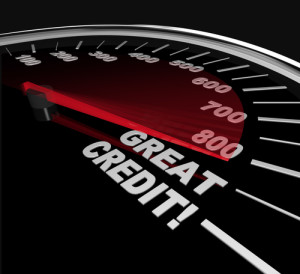If your credit score is just fair or even if it’s rated good you should be working to improve it. Your credit score is important for two reasons. First, when you apply for new credit the lender will check your credit score to determine how creditworthy you are – or how likely you are to repay the money. Second, the higher your credit score the lower interest rates you will be charged. This can make a huge difference when you’re buying a car or a house or applying for a personal loan or personal line of credit. It even makes a difference when you get a new credit card. Here’s an example, courtesy of LifeHacker.com, that shows the relationship between your credit score and the interest rate you will most likely be charged for a 30-year, fixed rate mortgage.
760-850 3.9%
700-759 4.1%
680-699 4.3%
640-659 4.9%
620-639 5.5%
As you can see if your credit score was 620 your interest rate could be as much as 1.6 percentage points higher than if your score was 760.
Your FICO score
Fair Isaac Corporation (FICO) compiles credit scores and this is why they are most often called FICO scores. The credit bureaus use a different scoring system so if you were to get your score from one of them or from a website such as CreditKarma it won’t be exactly the same as your FICO score. But it will be close enough that you’ll be able to see how lenders will view you and what kind of interest rates you would most likely be charged.
The five components of your credit score
There are five components that make up your credit score. The first and most important one is your payment history, which accounts for 35% of your score. There’s not much you can do about it because, well, it’s history. But you can improve it going forward and here’s what you need to do.
Pay all your bills on time
Pay all of your bills on time including your credit cards, student loans, utility bills and even club dues. No matter the bill, pay it on time. According to the data published on CreditCards.com, 1 out of 20 Americans is 30 days late on their credit card dues. It is revealed that the younger the card holder, the more likely they are to be delinquent.
If you can’t or just forget a payment and received a phone call or letter from a collection agency you need to respond immediately and try to negotiate to have the collection item removed from your credit file on the condition that you will pay the amount in full. If you are unable to pay only part of a past due amount, be strategic about which ones you pay first. Focus on those that you can pay fully for so they won’t continue to damage your credit score in the future.
Understand your credit utilization ratio
The second largest component of your credit score is your credit utilization ratio. What many people don’t understand is that it’s not the total amount of money you owe but the proportion of all your available credit that you’re using. As an example of this, if you have a balance of $5000 on a credit card that has a $20,000 limit (25% use) this would be better than if you had a balance of $1500 on a card with a $3000 limit because this would be 50% used.
What you could do
Maybe this comes under the category of “self-evident” but do not take on any new expenses or loans that you can’t afford. Try to reduce the revolving amount on your credit cards (the balance you carry over from month-to-month). If you’re pretty disciplined you could call one of your credit card issuers and ask to have your credit limit increased or apply for another credit card. There is an inverse ratio here, which is that increasing your total credit limit will decrease the proportion that you’re using. The reason that you would need to have pretty good self-discipline is that you could get in even worse trouble if you don’t enough willpower to hold your spending in check.
Length of credit
The third most important component of your credit score is your length of credit or how long you’ve had credit. The longer you have had credit, the better. To protect your history. never close an account unless you absolutely have to. If you’ve had a credit card for, say, 10 years this could be your credit score’s best buddy. The reason for this is because it serves as tangible proof that you’ve consistently paid on that credit card and on time.
If you don’t have a credit history start developing one as quickly as you can. Many of us get our first credit card while in high school. That’s okay as long as you start off with a card that has a very low credit limit so that you can’t do anything rash or foolish.
New credit
This category accounts for 10% of your total credit score. When you open a new credit account this will hurt your credit score at least for a while so stay away from this unless there is some reason why it’s absolutely imperative that you get a new line of credit. In fact, just getting your credit checked will affect your credit score. One credit application won’t ding your credit score very much but applying for a whole bunch of credit cards at the same time will.
The types of credit
Finally, the types of credit you have accounts for 10% of your total credit score. As you have probably discovered there are many different types of credit – credit cards, auto loans, mortgages, retail accounts and on and on. If you have different types this can sometimes help your credit score. But there’s no need to get many types of credit just to help your credit score.
What other things you could do to improve your credit score
In addition to the tips you’ve just read, there are several other important things you should do. First, check your credit reports, which you can get free once a year at www.annualcreditreport.com. When you get your reports be sure to review them carefully to make sure that they don’t contain errors. A report released by the Federal Trade Commission two years ago revealed that nearly 20% of us have errors in our credit reports serious enough they could be damaging our credit scores. Given this, it’s important to check over your reports carefully to make sure there isn’t any inaccurate information that’s damaging your credit score
Be careful, be very careful
Be careful about signing up for one of those services that promise to monitor your credit report on a monthly basis. These services generally charge up to $15 or $20 a month. However, there’s not much they can do that you can’t do yourself for free. In fact, what many experts advise is to get your free credit reports one at a time every four months. Do this and you will in effect be monitoring your credit throughout the year and without spending a dime to do it.





